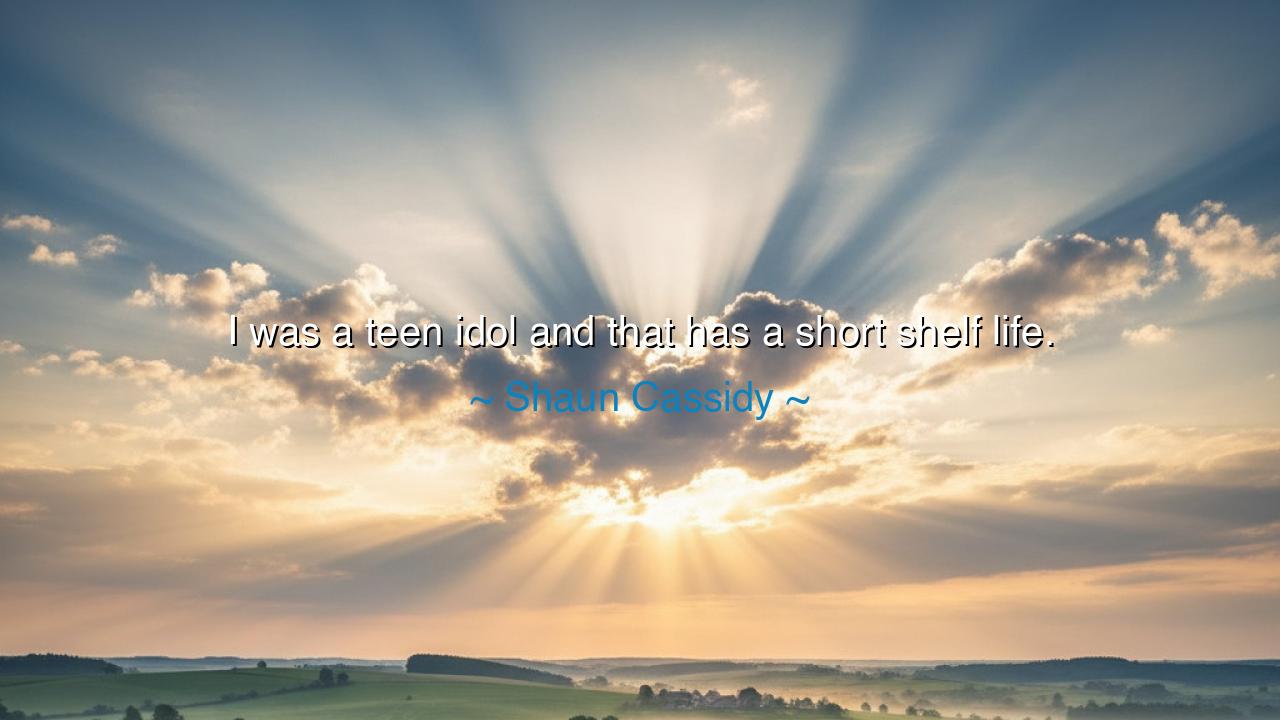
I was a teen idol and that has a short shelf life.






Shaun Cassidy once admitted with humility and clear-eyed wisdom: "I was a teen idol and that has a short shelf life." These words unveil the fleeting nature of fame, especially the kind built upon youthful charm and mass adoration. He acknowledges that the crown of idolhood, though dazzling in its season, is fragile and temporary. It burns bright for a moment, then fades as the audience turns its gaze to newer, fresher faces. His reflection is not bitter but honest, carrying the weight of one who has lived through both the ecstasy of youthful glory and the sobering truth of its decline.
The origin of this statement lies in Cassidy’s rise during the 1970s, when his music and television appearances made him a beloved figure among millions of teenagers. His posters adorned countless bedroom walls, his name was shouted with passion at concerts, and for a time, he lived as the very embodiment of the phrase teen idol. Yet as the years passed, so did the craze. He discovered what many before and after him would also learn—that fame built on youth and beauty is fragile, fading as quickly as it rises, for the tides of popular culture are restless and unkind.
History has witnessed many such stories. Consider Rudolph Valentino, the silent film heartthrob of the 1920s, whose untimely death cemented his status as an eternal idol, though his fame in life had already begun to wane. Or The Beatles, who began as youthful idols for screaming fans but realized they could not remain confined to that role forever, choosing instead to evolve musically and spiritually. Cassidy’s reflection belongs to this lineage: those who have tasted the ephemeral sweetness of being adored for youth, only to realize it cannot sustain a life or a career.
There is also within his words a profound meditation on identity. To be adored by millions as an idol is intoxicating, yet it is also dangerous, for it tempts one to confuse adoration with self-worth. Cassidy reminds us that such admiration is not eternal—it is tethered to an image, an illusion of youth, and when that image fades, one must rediscover the self beneath the applause. This is the true test of character: to build a life after the cheering stops, to find meaning when the spotlight turns away.
His statement also serves as a caution against the illusion of permanence. What is true of celebrity is true of many earthly glories—wealth, power, status. They all carry a short shelf life, and those who cling to them as though they are eternal are destined for disappointment. The wise understand that these things are but tools or seasons, and that the deeper treasures of life—purpose, love, creativity, and integrity—endure long after the world has moved on.
For us, the lesson is this: do not stake your life upon the fleeting applause of others. If recognition comes, welcome it with gratitude, but do not build your house upon it. Instead, root yourself in things that endure—your values, your craft, your relationships, your growth. The adoration of the crowd will fade, but the work of your hands, the depth of your heart, and the strength of your character can outlast every season.
Therefore, children of tomorrow, hear the wisdom of Shaun Cassidy. Do not be deceived by the glitter of temporary crowns. Youthful beauty fades, the cheers of the crowd grow silent, and the idols of one age are forgotten by the next. Seek instead to be more than an idol—seek to be a creator, a servant, a truth-bearer, a soul rooted in eternity. For when the shelf life of fame has ended, it is the eternal shelf of legacy that will remain, holding the treasures of a life well-lived.






AAdministratorAdministrator
Welcome, honored guests. Please leave a comment, we will respond soon